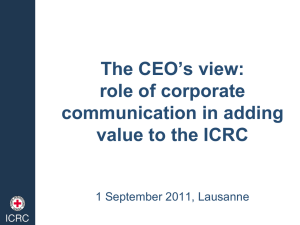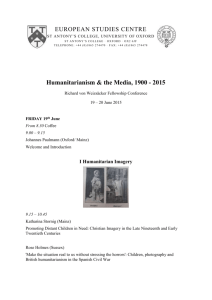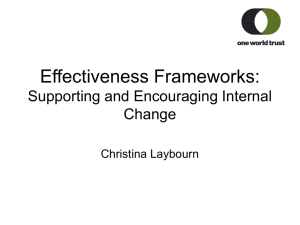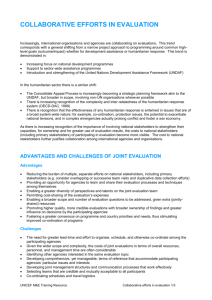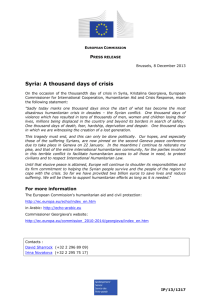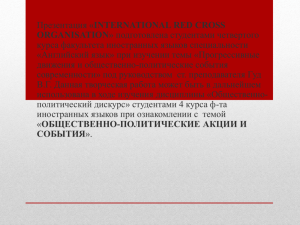I sometimes try to imagine what people in conflict areas
advertisement
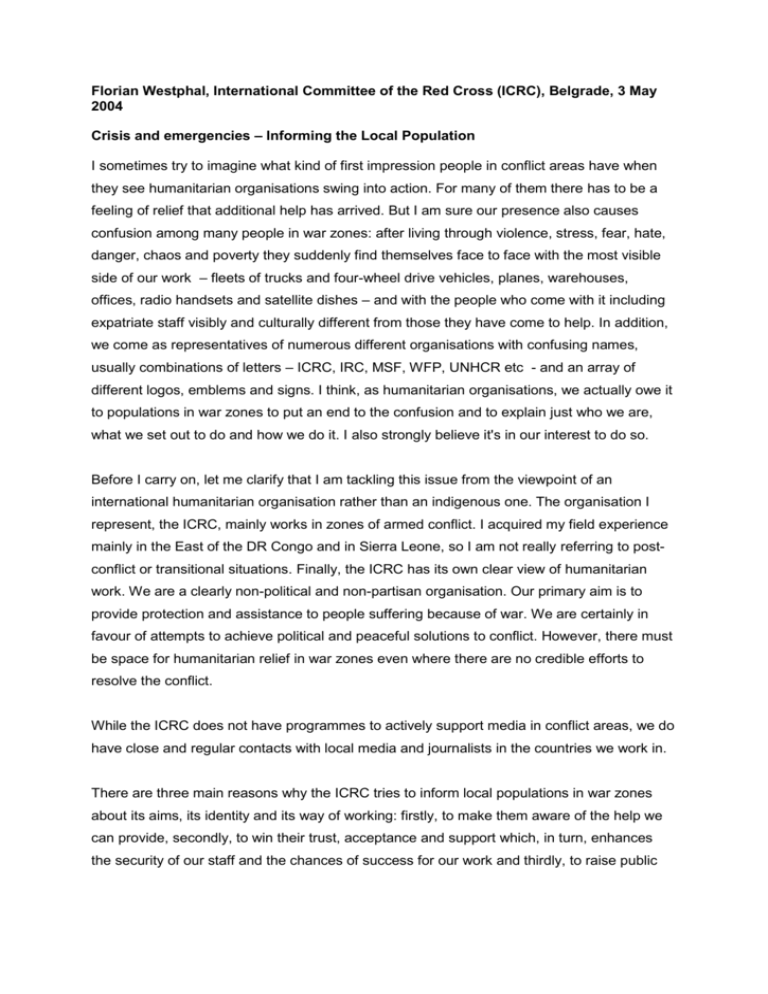
Florian Westphal, International Committee of the Red Cross (ICRC), Belgrade, 3 May 2004 Crisis and emergencies – Informing the Local Population I sometimes try to imagine what kind of first impression people in conflict areas have when they see humanitarian organisations swing into action. For many of them there has to be a feeling of relief that additional help has arrived. But I am sure our presence also causes confusion among many people in war zones: after living through violence, stress, fear, hate, danger, chaos and poverty they suddenly find themselves face to face with the most visible side of our work – fleets of trucks and four-wheel drive vehicles, planes, warehouses, offices, radio handsets and satellite dishes – and with the people who come with it including expatriate staff visibly and culturally different from those they have come to help. In addition, we come as representatives of numerous different organisations with confusing names, usually combinations of letters – ICRC, IRC, MSF, WFP, UNHCR etc - and an array of different logos, emblems and signs. I think, as humanitarian organisations, we actually owe it to populations in war zones to put an end to the confusion and to explain just who we are, what we set out to do and how we do it. I also strongly believe it's in our interest to do so. Before I carry on, let me clarify that I am tackling this issue from the viewpoint of an international humanitarian organisation rather than an indigenous one. The organisation I represent, the ICRC, mainly works in zones of armed conflict. I acquired my field experience mainly in the East of the DR Congo and in Sierra Leone, so I am not really referring to postconflict or transitional situations. Finally, the ICRC has its own clear view of humanitarian work. We are a clearly non-political and non-partisan organisation. Our primary aim is to provide protection and assistance to people suffering because of war. We are certainly in favour of attempts to achieve political and peaceful solutions to conflict. However, there must be space for humanitarian relief in war zones even where there are no credible efforts to resolve the conflict. While the ICRC does not have programmes to actively support media in conflict areas, we do have close and regular contacts with local media and journalists in the countries we work in. There are three main reasons why the ICRC tries to inform local populations in war zones about its aims, its identity and its way of working: firstly, to make them aware of the help we can provide, secondly, to win their trust, acceptance and support which, in turn, enhances the security of our staff and the chances of success for our work and thirdly, to raise public awareness of international humanitarian law, the body of international law that protects victims of conflict and imposes limits on the way wars are conducted. For many people in war zones confronted with relief organisations the first question on their mind has to be: can you help me? Can you show me where I can find some water or healthcare, food and shelter? Help me track down my lost child or contact my relatives to tell them I am still OK? There is a real need for humanitarian organisations to use all means of communication available to provide answers to these questions. Media play an absolutely crucial role in this respect. Local radio stations, newspapers and TV can inform about food distribution sites or safe water points; they can publish lists or photographs of unaccompanied children looking to be reunited with their families, or they can give valuable advice on how to prevent disease by taking basic hygiene and sanitation measures. In Liberia, for example, we have been using posters in public places as well as local radio and TV to help trace the families of unaccompanied children. Local media in places as diverse as Angola or Chechnya also play an important role in raising awareness of the danger posed by mines and other explosive remnants of war. However, just informing local people about how we can help is not enough. We also need to win their trust and support. Let me get back to my imaginary person in a war zone who comes across foreign relief organisations for the first time. One question that may well be on his or her mind is extremely important, yet perhaps too often overlooked: just who are you people from the Red Cross, the UN, the NGOs and other organisations? What are you doing here and what gives you the right to be here? Whose side are you on in this war? What is your political agenda? The simple fact that we, as humanitarian organisations, are convinced that we work in war zones for all the right reasons does not automatically imply that the people we have come to help see it the same way. And, to be honest, why should they be so trusting? Can we really expect them to accept without question or doubt that humanitarian organisations are not pursuing any economic or political interests? In many war zones people are absolutely convinced that foreign powers are somehow actively involved in the conflict and in fact in some conflicts – Afghanistan and the Congo to name but two – this has been the case. To make matters even more confusing foreign armies are increasingly involved in relief-style activities. The affected populations have a right to know what kind of relationship humanitarian organisations have with foreign armies present in their countries. Are we working with them or independently of them? On the other hand, it is certainly also in the ICRC's interest to clearly explain this relationship. Otherwise we risk being considered as part of the enemy by those who oppose the foreign military presence. Typically in war zones, conspiracy theories, rumours and propaganda abound. Since people have few means of checking whether they are true or not they are more easily believed. Even if many allegations against humanitarian organisations have no basis in fact this does not imply that we can afford to ignore them. For example, people directly affected by war often doubt that foreign organisations such as the ICRC can actually be neutral. In Sierra Leone, it was extremely difficult for people to accept that an organisation could claim to be neutral in view of the atrocities allegedly committed by both sides in the conflict. Humanitarian organisations need to confront these doubts openly and discuss them. We need to explain that neutrality does not mean indifference in the face of suffering but rather is a means to an end, a way of being able to help those who suffered the atrocities of war. The ICRC also tries to be transparent towards local people in order to enhance its own security. As an organisation generally working without armed protection we can only be safe in conflict areas if our identity and our activities are accepted. This is especially true for the conflict parties themselves, the soldiers or rebel fighters and their political leadership. This becomes particularly problematic in situations where one side to the conflict is largely unknown or where it has simply not been possible to communicate with them. Informing people in conflict zones can help us to be accepted, trusted, and safe and therefore makes it possible for us to do our job. However, simply informing people is not enough because it's essentially a one-way process. Instead as humanitarian organisations we should be ready to actually communicate, to listen, to be open to all those who have suggestions, questions, doubts or criticisms. This implies trying to be a learning organisation that constantly strives to better understand the environment it works. Personally I think the ICRC and others still have a lot of work to do in this respect. The third reason for the ICRC to communicate with the public in conflict areas is to raise awareness of international humanitarian law. Ideally we would like to have an impact on the behaviour of combatants, to try to ensure that they know that there is a body of law that dictates that they have to respect civilians and treat wounded or detained enemies with dignity. Fighters can only act in accordance with the law if they know what it is. Many combatants are remarkably ignorant as far as their obligations are concerned. Civilians, in turn, can only insist on their rights if they are aware of them. These legal issues are often directly linked to the reality on the ground. In Haiti, for example, combatants regularly attacked hospitals flying the Red Cross flag – a clear violation of the law, of course, but also a major humanitarian concern. One of the methods we used to tackle this problem was a radio spot informing local people about the importance of letting the wounded have access to care and about the Red Cross emblem as a visible sign of protection for medical facilities. Local media and local people must play a key role in getting these kinds of messages across. They have the knowledge and understanding necessary to identify appropriate subjects and to communicate them effectively. In many countries we try to encourage locals to see whether the rather dry language of international law can be better adapted to their environment. In most cultures, the essential principles – do not deliberately attack civilians, for example, or do not target religious sites – have been known for centuries and may simply need to be brought to the surface again. In Somalia, for example the ICRC and the Somali Red Crescent explain the law by drawing parallels with age-old local rules of warfare or by using traditional stories around well-known characters. One of the ICRC’s most effective means of raising public awareness of international humanitarian law is to enhance the capacity of the communication services of national Red Cross and Red Crescent Societies in conflict areas. Obviously, we know that simply informing combatants of how they ought to behave does not automatically imply that they will follow the rules. The relationship between information, knowledge and changes in behaviour is a lot more complex. However, once combatants have been told about the law they can no longer plead the excuse of ignorance but they can be held accountable for their actions. Local media provide a key outlet for communicating with people in conflict zones, not only to tell them what we do and how we do it but also to hear their concerns and to deal with their doubts. Wherever possible, debates, discussion programmes or phone-ins should be part of the strategy because they actually give people the chance to voice their opinions and ask questions directly. In this respect some NGOs have made an extremely important contribution by launching media projects in war zones, for example in Sierra Leone, Liberia or the DR Congo, that provide balanced information while giving those most affected by war the chance to make their voices heard. However, in many parts of the world there are few telephones or Internet connections and therefore few possibilities for the public to comment on what they have heard or seen in the media. Therefore humanitarian organisations also need to find other means of entering into dialogue with people in conflict region. To this end, the ICRC often working with national Red Cross or Red Crescent Societies tries to increase direct contacts with those who represent and shape public opinion: community representatives, parliamentarians, traditional or religious leaders, local NGOs and journalists can help as potential relays to reach and inform a wider public. A relatively free media environment is of key importance when it comes to informing local people about humanitarian issues and organisations. In many situations of conflict, media are regularly abused to spread hatred or reinforce the logic of war. In these cases, there is bound to be little space for information essentially aimed at helping people on all sides of the divide to deal with their problems. Finally, it has to be stressed that for the ICRC public information is primarily a means to an end, a tool to enable us to help those we have come to assist and protect. The ICRC will not communicate publicly if this risks compromising its ability to reach people suffering because of armed conflict. I think other humanitarian organisations may well find themselves in a similar position at times. There are limits to what the ICRC can say in public for the simple reason that the purpose of our organisation is not to make tomorrow's front-page headline but to try to help where help is needed most. Communication with local people must be a key element of the work of any humanitarian organisations in conflict zones. Giving out the right information at the right time may be just as important as handing out relief goods. Furthermore, communication with- and transparency towards those suffering because of war can prepare the ground and create the necessary conditions to allow humanitarian organisations to do their job. I am pleased to say that nearly every ICRC delegation now employs specialised communications staff to do this. Nevertheless there is a lot of work left to be done. Thanks you very much.
